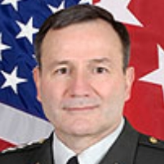Officials
Back to Officials


Offical

Name: Eikenberry, Karl
Current Position: Former Ambassador
While some retired military leaders have served as United States ambassadors, Lt. General Karl W. Eikenberry is the first active-duty general (or admiral) ever to be appointed to a top diplomatic post. Having agreed to retire from the U.S. Army upon his confirmation on April 3, 2009, Eikenberry brings to the job a wealth of knowledge about Afghanistan, having served two tours of duty that included commanding all American forces in the war-torn nation.
A native of Goldsboro, North Carolina, Eikenberry graduated from Goldsboro High School in 1969. He attended the U.S. Military Academy, and later earned master’s degrees in East Asian studies from Harvard University (1979-1981) and in political science from Stanford University. He also was a National Security Fellow at the Kennedy School of Government at Harvard (1992-1993).
Eikenberry became fluent in Chinese after studying at the United Kingdom Ministry of Defence Chinese Language School in Hong Kong, earning an Interpreter’s Certificate in Mandarin Chinese from the British Foreign Commonwealth Office. He also was awarded an advanced degree in Chinese history from Nanjing University in China.
Throughout his four-decade military career, Eikenberry held a variety of posts, both in the field and at a desk. His operational posts included service as commander and staff officer with mechanized, light, airborne, and ranger infantry units in the continental United States, Hawaii, South Korea and Italy.
He also has served in various strategy, policy, and political-military positions, including as Deputy Director for Strategy, Plans, and Policy on the Army Staff; Senior Country Director for China, Taiwan, Hong Kong and Mongolia in the Office of the Secretary of Defense; Assistant Army and later Defense Attaché at the US Embassy in Beijing, China; U.S. Security Coordinator and Chief of the Office of Military Cooperation in Kabul, Afghanistan; and Director for Strategic Planning and Policy for the U.S. Pacific Command.
Eikenberry served three years in Afghanistan over the course of two separate tours of duty. During his first tour, he was chief of military cooperation, with responsibility for rebuilding Afghan security forces, and later he served 18 months (2005-2007) as commander of the Combined Forces Command, putting him in charge of all U.S. forces stationed in the country.
In 2007, Eikenberry was transferred to NATO to serve as deputy chairman of the Military Committee in Brussels, Belgium, a post he held until being nominated for the ambassadorship to Afghanistan.
He has published numerous articles on U.S. military training, tactics, and strategy, on Chinese ancient military history, and on Asia-Pacific security issues. He was previously the president of the Foreign Area Officers Association and is a member of the Council on Foreign Relations.
As ambassador to Afghanistan, Eikenberry brings with him a track record for spotting problems in the country. He was one of the first to warn about the resurgence of the Taliban, and the need to develop the Afghan Army into a legitimate fighting force—which is currently a top priority for the Obama administration.
Eikenberry reportedly has a good relationship with Afghanistan President Hamid Karzai, and while serving at NATO headquarters in Brussels, he developed close ties with European allies that could be useful in convincing them to provide more support for the Afghanistan mission.
But in choosing an Army general, Obama does risk creating friction between the U.S. embassy and the American military operation in Afghanistan, led by General David McKiernan. Stephen Biddle, a defense specialist at the Council on Foreign Relations who has studied Afghanistan, said, “Given that most people think the situation in Afghanistan has been getting worse, and that policies are going to have to change, you just wonder what the chemistry will be between these two guys.”
Eikenberry has already stirred some controversy within the State Department when he announced that he would be bringing his wife, Ching Eikenberry, with him to Afghanistan. Such a move would collide with State Department rules that forbid family members of diplomats in countries designated as “an unaccompanied post” due to security concerns.
Envoy Choice Cites Urgency of Boosting War Effort (by Robert Burns, Associated Press)
Obama Taps a General as the Envoy to Kabul (by Eric Schmitt, New York Times)
Q&A with Karl Eikenberry (Asia Source)
- Latest News
- D.C. Public Schools will Teach all Second-Graders to Ride a Bike
- New Rule in Germany Limits Sales of Sex-Themed E-Books to 10pm to 6am
- What Happened to the 6-Year-Old Tibetan Boy the Chinese Government Kidnapped 20 Years Ago?
- U.S. Ambassador to Turkey Photoshops his Hair Color to Mock Turkish Mayor
- Mystery Artist Calls Attention to Unfixed Potholes by Drawing Penises around Them




